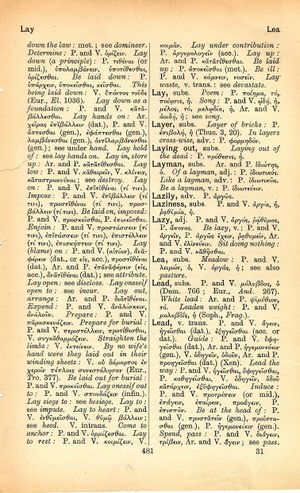lead: Difference between revisions
τά δέ ἄνευ συμπλοκῆς, οἷον ἄνθρωπος, βοῦς, τρέχει, νικᾷ → and the simple forms of speech, for example: 'man', 'ox', 'runs', 'wins'
m (Text replacement - "<b class="b2">Frag.</b>" to "''Frag.''") |
m (Woodhouse1 replacement) |
||
| Line 1: | Line 1: | ||
{{Woodhouse1 | {{Woodhouse1 | ||
|Text=[[File:woodhouse_481.jpg|thumb|link={{filepath:woodhouse_481.jpg}}]] | |Text=[[File:woodhouse_481.jpg|thumb|link={{filepath:woodhouse_481.jpg}}]] | ||
P. and V. [[μόλυβδος]], ὁ (Dem. 766; Eur., '' | ===substantive=== | ||
[[prose|P.]] and [[verse|V.]] [[μόλυβδος]], ὁ ([[Demosthenes|Dem.]] 766; [[Euripides|Eur.]], ''[[Andromache]]'' 267). | |||
P. and V. [[ἄγω | [[white lead]]: [[Aristophanes|Ar.]] and [[prose|P.]] [[ψιμύθιον]], τό. | ||
[[leaden weight]]: [[prose|P.]] and [[verse|V.]] [[μολυβδίς]], ἡ ([[Sophocles|Soph.]], ''Fragment''). | |||
===verb transitive=== | |||
[[prose|P.]] and [[verse|V.]] [[ἄγω]], [[ἄγειν]], [[ἡγεῖσθαι]] (dat.), [[ἐξηγεῖσθαι]] (acc. or dat.). | |||
[[guide]]: [[prose|P.]] and [[verse|V.]] [[ὑφηγεῖσθαι]] (dat.), [[Aristophanes|Ar.]] and [[prose|P.]] [[ἡγεμονεύειν]] (gen.), [[verse|V.]] [[ὁδηγεῖν]], [[ὁδοῦν]], [[Aristophanes|Ar.]] and [[prose|P.]] [[προηγεῖσθαι]] (dat.) ([[xen]]). | |||
[[lead the way]]: [[prose|P.]] and [[verse|V.]] [[ἡγεῖσθαι]], [[ὑφηγεῖσθαι]], [[prose|P.]] [[καθηγεῖσθαι]], [[verse|V.]] [[ὁδηγεῖν]], [[ὁδοῦ κατάρχειν]], [[ἐξυφηγεῖσθαι]]. | |||
[[induce]]: [[prose|P.]] and [[verse|V.]] [[προτρέπειν]] (or mid.), [[ἐπάγειν]], [[ἐπαίρειν]], [[προάγειν]], [[prose|P.]] [[ἐπισπᾶν]]. | |||
[[be at the head of]]: [[prose|P.]] and [[verse|V.]] [[προστατεῖν]] (gen.), [[προΐστασθαι]] (gen.), [[prose|P.]] [[ἡγεμονεύειν]] (gen.). | |||
[[spend]], [[pass]]: [[prose|P.]] and [[verse|V.]] [[διάγειν]], [[τρίβειν]], [[Aristophanes|Ar.]] and [[verse|V.]] [[ἄγω]], [[ἄγειν]]; see pass. | |||
[[be the first]]: [[prose|P.]] [[πρωτεύειν]]. | |||
===verb intransitive=== | |||
[[tend]]: [[prose|P.]] and [[verse|V.]] [[τείνειν]], [[φέρω]], [[φέρειν]]. | |||
[[tend]] (of [[roads]]): [[prose|P.]] and [[verse|V.]] [[φέρω]], [[φέρειν]], [[ἄγω]], [[ἄγειν]]. | |||
[[lead against]]: [[prose|P.]] and [[verse|V.]] [[ἐπάγειν]] ([[τινά τινι]]). | |||
[[lead astray]]: [[prose|P.]] and [[verse|V.]] [[παράγειν]], [[πλανᾶν]]. | |||
[[lead away]]: [[prose|P.]] and [[verse|V.]] [[ἀπάγειν]]. | |||
[[lead back]]: [[prose|P.]] [[ἐπανάγειν]]. | |||
[[lead in]]: [[prose|P.]] and [[verse|V.]] [[εἰσάγειν]]. | |||
[[lead on]]: [[prose|P.]] and [[verse|V.]] [[ἐπάγειν]], [[προάγειν]], [[ὑπάγειν]]. | |||
[[lead out]]: [[prose|P.]] and [[verse|V.]] [[ἐξάγειν]]. | |||
[[lead out against an enemy]]: [[prose|P.]] [[ἐπεξάγειν]] (absol.). | |||
[[lead round]]: [[prose|P.]] [[περιάγειν]]. | |||
[[lead through]]: [[Aristophanes|Ar.]] and [[prose|P.]] [[διάγειν]] ([[τινὰ διά τινος]]). | |||
[[lead up]]: [[prose|P.]] and [[verse|V.]] [[ἀνάγειν]]. | |||
===substantive=== | |||
[[guidance]]: [[prose|P.]] [[ὑφήγησις]], ἡ. | |||
[[take the lead]]: [[prose|P.]] and [[verse|V.]] [[ἡγεῖσθαι]], [[prose|P.]] [[ἡγεμονεύειν]]. | |||
}} | }} | ||
Revision as of 08:49, 20 May 2020
English > Greek (Woodhouse)
substantive
P. and V. μόλυβδος, ὁ (Dem. 766; Eur., Andromache 267).
white lead: Ar. and P. ψιμύθιον, τό.
leaden weight: P. and V. μολυβδίς, ἡ (Soph., Fragment).
verb transitive
P. and V. ἄγω, ἄγειν, ἡγεῖσθαι (dat.), ἐξηγεῖσθαι (acc. or dat.).
guide: P. and V. ὑφηγεῖσθαι (dat.), Ar. and P. ἡγεμονεύειν (gen.), V. ὁδηγεῖν, ὁδοῦν, Ar. and P. προηγεῖσθαι (dat.) (xen).
lead the way: P. and V. ἡγεῖσθαι, ὑφηγεῖσθαι, P. καθηγεῖσθαι, V. ὁδηγεῖν, ὁδοῦ κατάρχειν, ἐξυφηγεῖσθαι.
induce: P. and V. προτρέπειν (or mid.), ἐπάγειν, ἐπαίρειν, προάγειν, P. ἐπισπᾶν.
be at the head of: P. and V. προστατεῖν (gen.), προΐστασθαι (gen.), P. ἡγεμονεύειν (gen.).
spend, pass: P. and V. διάγειν, τρίβειν, Ar. and V. ἄγω, ἄγειν; see pass.
verb intransitive
tend: P. and V. τείνειν, φέρω, φέρειν.
tend (of roads): P. and V. φέρω, φέρειν, ἄγω, ἄγειν.
lead against: P. and V. ἐπάγειν (τινά τινι).
lead astray: P. and V. παράγειν, πλανᾶν.
lead on: P. and V. ἐπάγειν, προάγειν, ὑπάγειν.
lead out against an enemy: P. ἐπεξάγειν (absol.).
lead through: Ar. and P. διάγειν (τινὰ διά τινος).
substantive
take the lead: P. and V. ἡγεῖσθαι, P. ἡγεμονεύειν.

